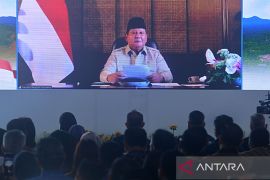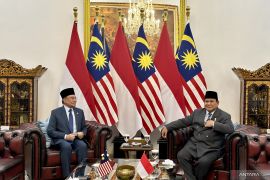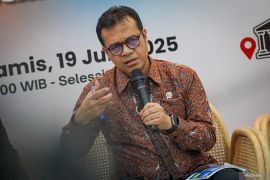"Indonesia invites all parties to continue to maintain peace and stability in the region," Foreign Minister Retno L.P. Marsudi said.Jakarta (ANTARA News) - Rising tensions in the South China Sea have become a global concern, as over half of the worlds annual merchant fleet tonnage and one-third of all maritime traffic worldwide pass through its shipping lanes.
Encompassing an area of some 3.5 million square kilometers from the Straits of Karimata and Malacca to the Strait of Taiwan, the South China Sea has shipping lanes that connect East Asia with Europe and the Middle East, with US$5 trillion worth of goods being transported through its waters every year.
Moreover, it accounts for some 12 percent of the annual global fisheries catch and has abundant oil and natural gas reserves.
China, Taiwan, and Vietnam each stake claim over much of the South China Sea, as well as all of the Spratly and Paracel island groups.
Brunei claims a southern reef of the Spratly Islands, Malaysia claims three islands in the Spratlys, while the Philippines claims eight islands in the Spratlys and significant parts of the South China Sea.
Although Indonesia is not a claimant state, Chinas nine-dash line, however, encroaches on its territory extending out from the Natuna Islands.
An international tribunal in The Hague recently ruled against Chinese claims to rights in the South China Sea, backing a case filed by the Philippines.
The Permanent Court of Arbitration said there was no evidence that China had historically exercised exclusive control over the waters or resources.
However, China has called the ruling "ill-founded," saying it will not be bound by it.
On July 12, ahead of the Tribunals decision on the South China Sea, the Indonesian foreign ministry issued a statement calling on all parties to exercise self-restraint and to maintain peace and stability in the region.
"Indonesia invites all parties to continue to maintain peace and stability in the region," Foreign Minister Retno L.P. Marsudi noted in the statement.
The minister reiterated her call on July 20, that all concerned parties should prioritize peace as they work to resolve the disputes in South China Sea.
"In short, we call on all parties to exercise restraint and not do anything that could increase tension in the region. (Instead, they should) prioritize peace and stability in the region," Foreign Minister Retno Marsudi said when queried by newsmen at the presidential palace compound.
She stated that Indonesia emphasized the importance of respecting international laws, including the 1982 UN Convention of the Law of the Sea.
She argued that stability and peace in South China Sea would help economic growth in Asia.
"I am convinced that open conflict is not a good option for us all and I think everyone must continue to avoid any power projection measures," she advised.
Regarding Chinas rejection of the ruling of the international arbitration tribunal that favored the Philippines, Minister Retno underlined that Indonesia would keep monitoring the developments.
She, however, made it clear that Indonesia would maintain its position as supporting a peaceful settlement and will reject any unnecessary actions that could escalate the situation.
Earlier, Indonesian Defense Minister Ryamizard Riyacudu had also voiced a similar call on the need to maintain security and stability in the South China Sea.
"Despite the rising tensions, the trade lanes in South China Sea should be secured, as they are important and of high economic value," the defense minister had stated on July 18.
Riyacudu conveyed the call to Chinese Ambassador to Indonesia Xie Feng to be forwarded to Chinese Minister of Defense Chang Wanquan.
"I would like to emphasize that although China does not agree with the arbitration ruling, the trade lane should be secured," he affirmed.
Although some ASEAN countries have chosen to side with the Philippines or China, Indonesia has taken a neutral stance and has urged all parties to prioritize peace in resolving the South China Sea dispute.
In the meantime, Indonesia believes that the Tribunals ruling will help to strengthen its efforts in the fight against illegal fishing.
"One of the impacts of the ruling is that Indonesias position will become stronger in its fight against illegal fishing in our countrys waters," Arif Havas Oegroseno, deputy for coordination of Maritime Affairs of the Ministry of Maritime and Fisheries, remarked recently.
Indonesia is committed to protecting its maritime area from illegal fishing activities, Arif pointed out, adding that the FAO had admitted it while stating that Indonesia was the only member of the Association of Southeast Asian Nations that had shown a strong commitment to fighting fish poaching.
Following the ruling, Indonesia would enjoy other benefits, including clear maritime definitions and sea demarcations, so it would not need to harbor future concerns over the nine-dash line, he added.(*)
Reporter: Fardah
Editor: Heru Purwanto
Copyright © ANTARA 2016











